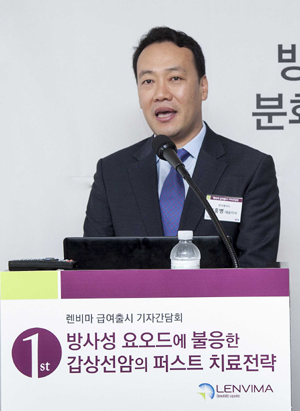Eisai Korea said Friday its thyroid cancer treatment Lenvima (ingredient: lenvatinib) gained insurance coverage on Aug. 24 as the first line of therapy for a rare type of thyroid cancer.

Lenvima was approved as a monotherapy to treat patients with radioactive iodine-refractory differentiated thyroid cancer (RR-DTC), the company said.
“RR-DTC is rare, representing less than 5 percent of the population,” said Professor Lim Dong-jun임동준, a professor at Seoul St. Mary's Hospital, at the company’s press conference Friday. “It is important to establish a treatment strategy for patients with differentiated thyroid carcinoma who do not respond to radioactive iodine, since the 10-year survival rate is only around 10 percent.”
Lenvima is a kinase inhibitor that blocks certain proteins that help cancer cells grow and divide. The drug had gained the Ministry of Food and Drug Safety approval in 2015.
“We expect [the drug] will be recognized for its effectiveness in the market as the first line of treatment for radioactive iodine-refractory differentiated thyroid cancer,” said Eisai Korea한국에자이 CEO Charlie Hongbyung Ko.
The drug’s efficacy was demonstrated in a clinical trial that divided 392 patients with progressive, radioactive iodine-refractory DTC into two groups where one took Lenvima, and the other, a placebo.
Results showed that those taking Lenvima showed a median progression-free survival of 18.3 months versus 3.6 months for those that took a placebo. Also, 65 percent of patients treated with Lenvima saw a reduction in tumor size versus 2 percent of patients receiving a placebo.
"Lenvima has shown effectiveness in clinical trials and real-life cases by inhibiting tumor angiogenesis and cancer growth as a fibroblast proliferative factor receptor (FGFR) inhibitor," said Professor Kim Won-bae of Asan Medical Center as he spoke of the real life clinical benefits of the drug.
The professors also commented on the reported side effects of the drug that may have had to do with six deaths. In fact, four out of the six deaths were unrelated to the medication, he said.
“Although the drug may seem to have more side effects at first glance, the cases with reported side effects turned out to be a problem of dosage, which can be easily controlled now,” Professor Lim noted.
The drug is available in 40 countries including the United States, Europe, and Japan and is recommended by guidelines under the American Thyroid Association (ATA) and National Comprehensive Cancer Network (NCCN) to treat DTC, the company said.
Eisai is also conducting clinical trials to demonstrate the drug’s efficacy in other cancer types such as renal cancer, non-small cell lung cancer, and hepatocellular carcinoma, the company said.
The drug is currently used a second-line combination treatment for renal cell carcinoma in the U.S. and Europe.

